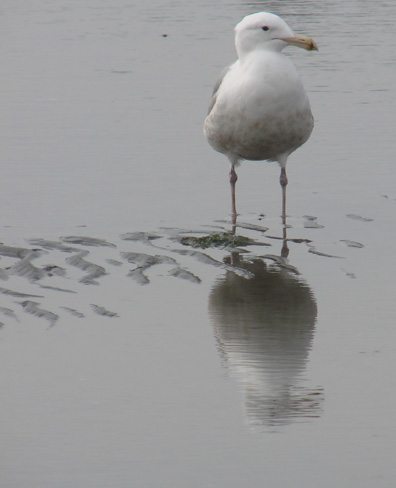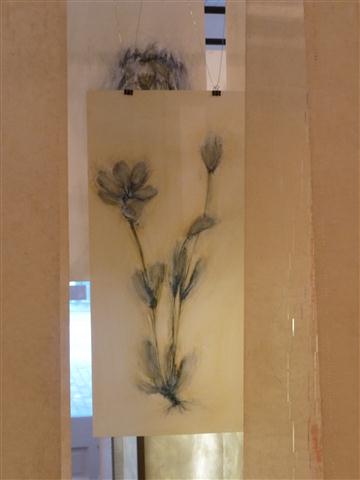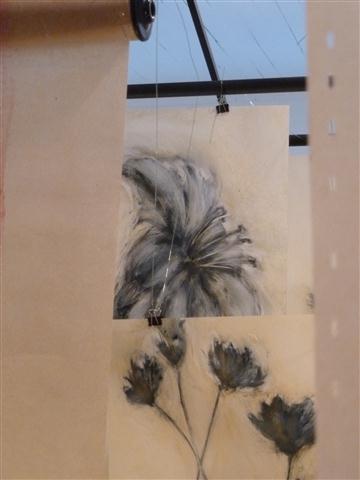Whistler phoned at four o’clock.
I looked at the call display and almost didn’t answer. I no longer picked up any out-of-province number, the latest political leadership race having inundated the social media – e-mail, twitter, Facebook, Linked-in and telephone, to name only the ones I am connected to. This one was a 250-200 number and, though there was something familiar about the last four digits the description which said, “unknown BC resident”, I was wary of another recorded laudatory tape from the nine candidates for party leader.
“Hello?” I said, with misgiving, waiting for the silence and the click over to recorded message.
“Hello000, Auntie? It’s your perpatetic nephew, Whistler.”
“Whistler!” I replied with joy. “Where are you?”
“I’m with Jessie, here in Delta.”
“Oohh! Is Jessie home?”
“Yup. And I’m here helping her.
“How is she?” I asked, greedy for news. “Let me speak with her when we’re done.”
“We’re going to do something different, Auntie, if you can find time for us. We’re both going to come out to visit you. We’ve got today or tomorrow. Lunch. Dinner. Just an hour or two for coffee. Whatever you can do. You can catch up with Jessie then.”
At that moment, Wednesday was looking impossible. I was trying to get into Vancouver for a number of different reasons.
“Come out for dinner tonight. I’ll get a reservation. How about six?”
“How about between six and six-thirty?”
“Alright. See you then.”
I rung off. Carol who was helping organize my study said, “Who was that?”
“My nephew, Whistler.He’s in town from up-country. Visiting Jessie who’s just back from Ireland. Europe, really. She’s been traveling around.They are friends.”
In the back of my mind, I was thinking, why doesn’t he marry her?, as I turned from our task at hand to make a reservation at a lovely Italian restaurant, fireplace, table linens and all.
It was moments later as I was lifting a box from the top shelf of the wall unit that my head began to spin.
“Sorry, Carol.” I wavered, “I just can’t do this. It’s foolish for me to be up on this ladder. I’m getting dizzy. Can you?”
As Carol handed me down the storage boxes we were marking for future retrieval, my head began to spin even more.
“I have to lie down for a minute,” I said, and Carol continued on with a different task , scanning the ancient photos into the computer. I wrapped up in the sofa blanket and covered my eyes with a face cloth to block out the light. A slight nausea defined itself. The headache I had denied at the doctor’s office at noon had found it’s way behind my left eyebrow.
“What is it?” Carol asked. “What’s wrong?” I’d been perfectly fine when she arrived. The onset of the vertigo had been sudden.
“I don’t know. Maybe it’s the antibiotic. I don’t take much medicine. My body sometimes reacts strongly to new medicines. It says to take after a meal. Maybe it didn’t recognize my afternoon snack as a meal and it didn’t buffer enough. Just give me a little time. I’ll be alright.”
But as I sat under the blanket gathering myself back into a state of wellness, my mind kept thinking what to do. It wasn’t too late to cancel but, by God, I so delighted in their company that I didn’t want to miss the opportunity. But the gnawing head and slight nausea had taken away my appetite. It was no night for a glass of wine, table linens and an upscale dinner for me. Much better a small restaurant, or maybe even take-out. That decision could be made when they arrived.
Carol left at five thirty. I was up again and feeling tolerable.I went to change and was upstairs when the doorbell rang, wouldn’t you know.
“Hey, Auntie!” cried Whistler. “Hey, Kay,” added Jessie, their smiles from ear to ear. What I loved about these two was that they could be serious, but they always carried joy with them. Every sad recounting was filled with jokes or rueful laughter, and the good times were filled with stories and happiness.
“Don’t bother taking your shoes off. We’re going to dinner. How’s Chinese? My car or yours. I know where I’m going.”
We took my car and parked just beside Tim Horton’s. I’ve just discovered The Happy Kitchen this past two weeks. Their food is glorious Chinese cooking, with fresh vegetables cooked to perfection – just a little crunch to them. Nothing soggy.
“Well, how about the house?” I ask, eager for news.
Jessie is the co-executor for her mom’s estate, a thing we had in common. Her sister, the other “co” was decidedly unhelpful, uncooperative. I didn’t dare express my feelings until I knew where she was going. It wasn’t my decision, but I hoped she would make the right one.
Jessie is one of those ebullient beings who talks constantly, always has a circuitous tale to tell. She had other things in mind besides answering my question directly. It all depended on a thousand detail which had to be brought to bear, before I could deserve the answer.
“When I got home, I knew everything would not be the same. But I had no idea,” she started. “Melanie drops everything wherever she last used it. Nothing had been put away for six months. Carlos is coming to visit for his holidays. He’s a bit of a neat freak. Even though I’ve warned him, I can’t let him see this. He’d turn his back and run away! And you know I ask Melanie to clean up after herself, but she never does.”
“I know I’m part of the problem. I am trying my best not to do for her the things she is responsible for. Now instead of picking up and sorting out her things, I just dump them in her room and close the door. I’m concentrating on the common rooms. I was so proud of myself. I got one of those blue-green stains in the bathtub downstairs completely removed – you know, where the tap drips. I was so happy about that. It’s the guest bathroom and is hardly ever used, so it rarely got cleaned. It must have been twenty years since that blue stain has been there. When I showed it to her, Mel said, “Wow, it’s looking really clean. That’s great Jessie. I guess I should go clean my room up!” She never even thought about helping me with the common areas. And you know, I’ve been away for six months. It’s all her mess in the common areas.”
As Jessie served herself more crispy noodles and green beans with cashews, I caught my chance to say a word. Whistler, by the way, says nothing. Chuckles when appropriate. Smiles, if amused. Shrugs his shoulders or nods his head from time to time. You can tell he is listening, but he’s not talking.
“So what does this mean, about the house? I don’t think Melanie is going to change, do you?”
It was twenty minutes later that she confessed that she didn’t think she could live with her sister. They would have to sell this inherited house, the family home she had grown up in. But where would she come back to if she didn’t have a house? How would she get into the housing market if she didn’t already have one that would keep pace with the vagaries of Real Estate?
“Do you know where you are going to be working? Or staying?”
Jessie’s new boyfriend was Spanish. Working in Ireland – an IT engineer. Headhunted from Spain. He had everything laid out for him before he arrived – a visa of long duration, an apartment furnished in IKEA modern. But Jessie had outstayed her student work exchange visa, gone traveling, activated a tourist visa and then it too had run out. She had to depart before the last day or it would be impossible for her to get back in. She could stay with him, but she would have to leave again. She couldn’t speak Spanish, but she would have to learn. They hadn’t explored the possibility of Canada yet.”
“So what’s his last name? Where does he come from? What do his parents do? ” Kay asked, laughing. “I’m sounding like my mother. But who is he? ”
“Hah! You are just like my mother. Asking questions.”
“Someone has to do it. And I learned from my mother really well. I hated it. But now I know how to say, “Don’t they have a last name?” really well. Whistler joined in the laughter. My questions were serious, but our collective friendship was so open that we could make fun of the stifling traditions we came from and still dig down into the important things. We didn’t hold back. She wasn’t offended, rather, she said, “Now that Mom’s gone, it’s really comforting to be able to hear you say what she would have asked me. It really helps me think things through.”
It reminded me of the first time Whistler had come to live with his grandmother, my mom, while he was going to university. We were raking leaves in the back yard together and I explained some family dynamic to him in all it’s gory detail, along with my analysis of what the outcome would be. I heard back from my sister, his mom, shortly after. “He said to me, a bit incredulously, “Y’know Mom, she talked to me like I was an adult! Just like I was another person, not just a young kid who couldn’t understand. Why doesn’t everyone do that?”
I had hated being “protected” from the evils of ours and everyone else’s dysfunctional families. I had seen things with my eyes, only to be lied to. It was the only way to describe it. Lied to. Covered up. Euphimized. Obscufated. To the point where I questioned my sanity. Only to find out much later that I wasn’t wrong. Only, the neighbours, the work place, the world, should not know that these things had occurred or our family, or their families, would be shamed, shunned, talked about, scorned.
I had felt that honesty and clear vision was better. If you knew about a problem and shared it, how much experience could be brought to your assistance from others who had already been there, coped or not coped, learned valuable lessons. Besides, many of the problems were not that drastic. But if you kept them as subterraneous motifs in a family, problems worsened, created a certain madness that crept into daily decisions, actions. I never shied the truth with Whistler.
We were back at my home now, getting an after-dinner coffee.
Jessie continued:
“We visited his parents at Christmas. They’re really nice. He makes things out of iron in a shop that has been there forever. All of his life and the generation before him.Decorative things. Useful things. He’s an artist, really. I guess that’s what he is. An artist. Beautiful things. You’d love it. And they are so nice. You wouldn’t believe. But it was so stressful. Carlos didn’t understand why it would be stressful, but it was, like, I was meeting his parents and that would have been stressful in itself, but I couldn’t speak to them. Everything was said in Spanish. They said they were too old to learn English.”
As she continued on in her stream of narrative, I had a second narrative coursing in the back of my mind.
Jessie could have been my child. I had been shocked, just after her mother’s death from a massive heart attack, that her mother was only sixty four. It was my age. How would I have brought up a child? I had none of my own. I had brought up my brother’s boys for a short period of time – five of the teenage years. I had succeeded with one and less-so with the other. I had spoken the truth from my viewpoint with them as well. No secrets. I remember saying to each one of them as they stepped out into an independent activity, a first-time adult activity, that they could always tell me anything. I’d been there. I had faced tough decisions myself. Failed at things and gotten back up on my feet and carried on. They couldn’t shock me. I had been a hippie. I’d done drugs and thankfully escaped the consequences. And don’t go there. The drugs are a million times worse now. I hadn’t touched them for more than thirty years. Not even the so-called soft ones. Had loved and lost in anguish. Had moved forward after a lot of soul searching. I had loved deeply and lost. I’d lived through the pain and survived to the other side of it. I had had sex before marriage, believe it or not, and they couldn’t shock me there either. If they had a problem, we could discuss it. I wasn’t going to go ballistic on them. Of course, I found out that the world has changed. They could shock me and they did. But it didn’t stop the plain speaking or the ability to discuss it with them.
And now here was a blessing for me, indeed. I had a friend of that same kind of openness that I desired; and she was thirty years younger, and still able to talk to me just like a friend. But she was the daughter I would have liked to have had. Fearless in greeting the world. Adventurous in her travels. Savvy after several years working outside Canada, vacationing in between in exotic places half way around the world. It’s not to say she hadn’t had sad moments or moments of reflection, but she carried joy with her.
“I couldn’t go back to Ireland. You can only have three months a year as a visitor. I’d had thoughts of going to China, but the Lonely Planet says a woman definitely shouldn’t go alone. She could be kidnapped. It wasn’t safe. So I went to Prague. I loved it. I stayed in a hostel and had a great time. I met wonderful people. I shouldn’t have been lonely, but I realized I had been moving around too much. It was time to come home.” Jessie peppered this with recountings of people she had met. She lapsed into an Irish accent as she described a Trinity College student who insisted on walking her home after a night at the pub there in Prague.
“He had rings in his nose and studding his ears. He had punk boots and belt.’ She stopped a moment and fixed me in the eye. “Do you know how crazily difficult it is to get into Trinity?” I did.
“I looked at him,” she continued, laughing, “and said to him that he was the most unlikely looking young man for such chivalry.He replied to me that he couldn’t help it.His Mam had instilled manners into him and there was nothing for it. I accepted his offer, of course. He danced around me as we were walking to make sure he was always walking on the outer side of the side walk. Heavens! Men in Canada don’t even know they are supposed to do that; that it’s a time-honoured rule!”
“And so are you going to marry him?” I said, bringing her back to Carlos.
“He’s so nice,” she continued her peripatetic conversation, not willing to divulge the answer too quickly. “He’s so good for me. But we will have to wait and see. He still has to come here and see who I am on my own territory. I don’t know where I am going to work. We can’t live at long distance. Something has to be worked out. I could live in Northern Ireland because I have the right to a British long term visa as a daughter of an Englishman. I could work there and travel down to Dublin on weekends, or he travel up to me.?
I could see everything was in flux. No point in adding my two cents. She was doing just fine at finding her way, making her decisions. Not foolishly jumping into an untenable situation. I was proud of her. I was thrilled really, to have her as my friend.
On parting, she promised to come out and visit me after Whistler had gone home. Whistler, in a rare moment of speech, said, “And what? Leave me out of all the details?”
“Oh Whistler, you get to know them from me when we talk by phone. You don’t miss anything. But I don’t see Jessie that often.”
“I know. I don’t say much . But I listen. There’s always something new that I find out in the retelling. I don’t want to miss anything. I’m like my father that way.” And it was true. He was.
Jessie looked at me sinking into the comfy chair in the living room as I faded. I had managed to keep up with their youthful energy for three hours but now I was hardly holding up and the big armchair was no longer making it possible.
“I think we should leave and give you some rest. To bed with you,” advises Jessie. I nodded. I hated to let them go, but I was no longer operative.
It took another half hour. More stories. Me with some apricot puree from the summer for them. The impossibly simple recipe. Her desire for children, and Carlos, but at her age, the biological clock ticking.
They went. I watched from the window in the front door and waved until the car turned out of the driveway. I could picture my mother doing the same. Glad to be able to sink into my very comfortable bed until the ills righted themselves; wistful at their departure; happy as can be at their visit and the news.
I’ve heard them talk about why they wouldn’t marry, these two; so I’m very glad that they are such good friends. Lord bless them both, I hope they stay friends even if Jessie ends up living in Europe somewhere. She’s making good decisions. Her heart’s in the right place. And I hope they will always be a part of my life.
I





